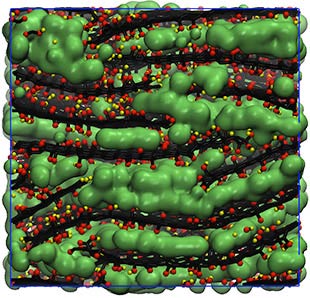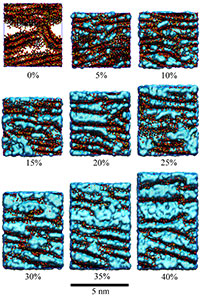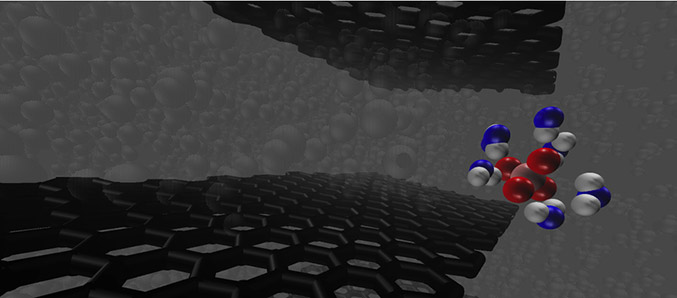Molecular simulation and statistical mechanics
Statistical mechanical theory and molecular simulation provide the link between the properties of molecules and the equilibrium and dynamical properties of bulk matter. These tools are applied both to the pursuit of pure science and to real life, engineering and industrial applications. We are also actively engaged in the development of new methodologies and algorithms.
Our techniques include:

Molecular dynamics and Monte Carlo simulations
These molecular-scale simulation techniques are used both to test statistical mechanical theory and to predict the equilibrium and dynamical properties of a wide variety of systems.
In the Department of Chemical Engineering, the multi-scale modelling group uses these techniques are used to study the properties of polymers, colloidal supensions, gels and emulsions, liquid crystals, porous materials and catalysts and many other systems of scientific and industrial importance. In the advanced functional materials and analytical science group, molecular dynamics simulation is used in the study of crystallisation. Finally in biochemical and bioprocess engineering, molecular simulation and statistical mechanical theory is used to study the interactions between proteins.
In the Department of Materials, classical molecular dynamics and statics methods with simple empirical potentials are used to study the evolution of metal microstructure from the atomistic scale. Key projects include developing better understanding of primary processes of irradiation damage in highly textured zirconium alloys and understanding the fundamental mechanisms of grain boundary migration in polycrystalline metals.
In the Department of Chemistry, simulation combined with statistical mechanical theory is used to develop novel liquid state theory with a focus of predicting entropies of challenging, complex types of system in the liquid phase found in living organisms, chemical synthesis or soft matter. You can also find out more about this group for Computational and Theoretical Chemistry.

Statistical mechanical theory and new simulation techniques
As well conducting simulations, Manchester researchers are also developing new simulation techniques and new statistical mechanical theory. In the Department of Chemical Engineering, the multi-scale modelling group is developing hybrid models for the multi-scale simulation of soft matter, novel techniques for dynamic Monte Carlo and Dissipative particle dynamics and new statistical mechanical theory related to the equilibrium and dynamical properties of liquids, liquid crystals and emulsions.
In the Department of Chemistry, new theoretical techniques are being developed to study the entropy of complex systems, for example by Dr Richard Henchman. Also in the Department of Chemistry, Jim Warwicker's group is developing web accessible methods for predictive modelling in bioprocessing.

Coarse graining and Dissipative Particle Dynamics
Systems such as colloidal suspensions, polymers, gels and emulsions have characteristic length and time scales that are out of the range of molecular simulation techniques. To deal with such systems, coarse graining techniques are required. In the Department of Chemical Engineering, the multi-scale modelling group uses techniques such as the iterative Boltzmann method to systematically reduce the complexities of a system by clumping several atoms into a single interaction site. Further coarse-graining takes place in Dissipative Particle Dynamics simulations, which allow the modelling of surfactant systems, for example, up to time sale of micro-seconds.
